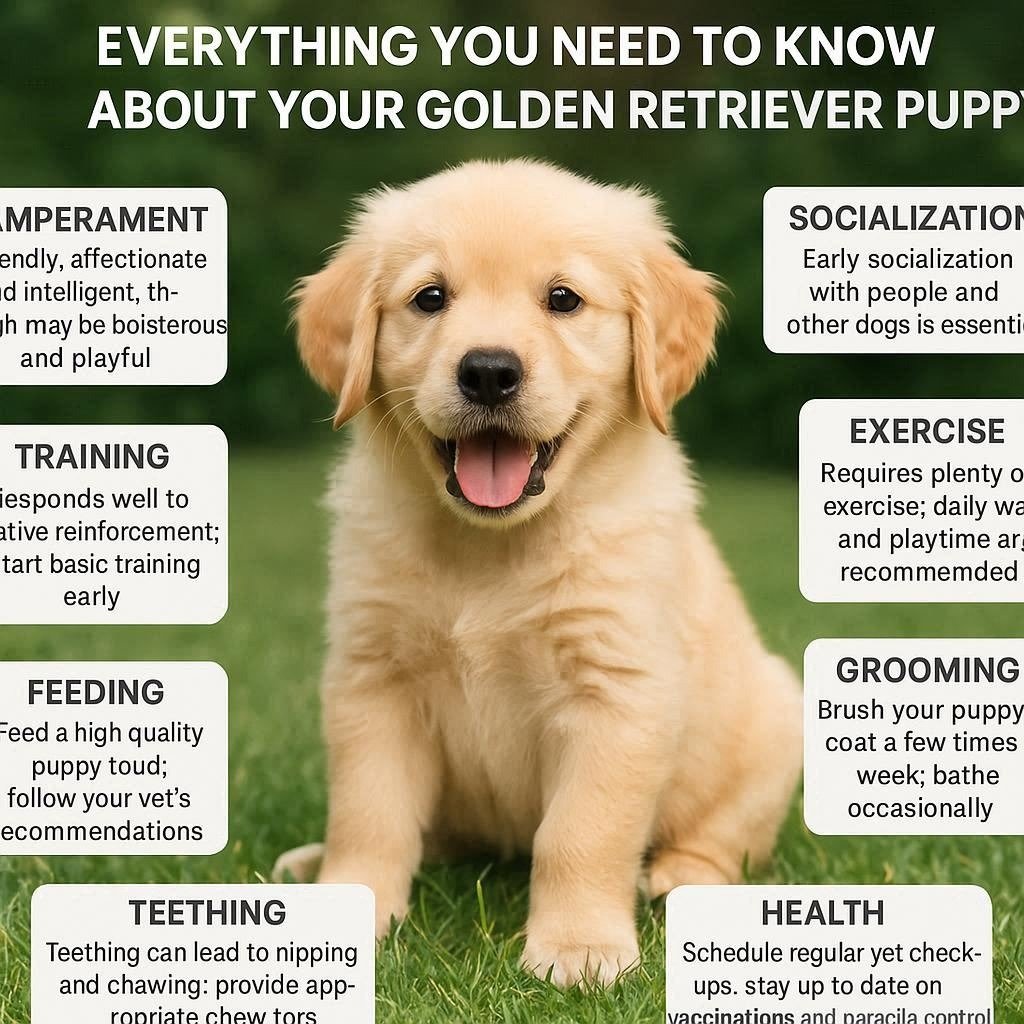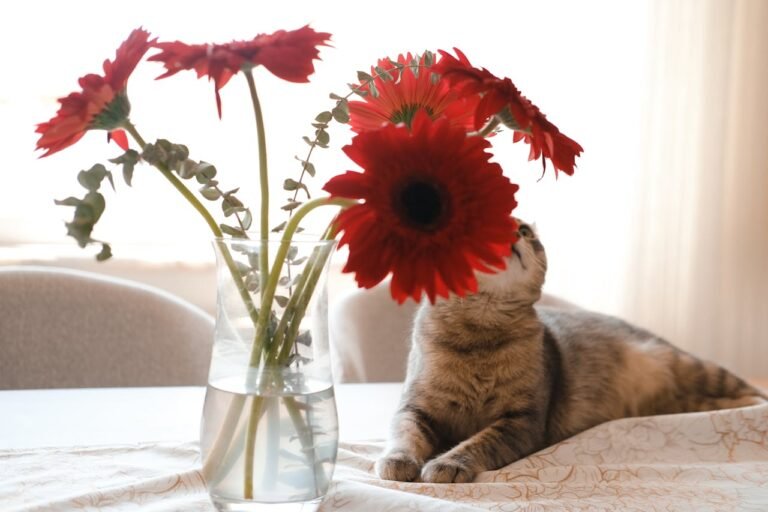Everything You Need to Know About Your Golden Retriever Puppy
Everything You Need to Know About Your Golden Retriever Puppy
Your complete guide to raising a happy, healthy Golden Retriever companion
There’s nothing quite like the moment you first hold your golden retriever puppy – those soft, fluffy ears, that distinctive golden coat, and those expressive eyes that seem to understand you already. Bringing home a Golden Retriever puppy is one of life’s most joyful experiences, but it also comes with significant responsibility. These intelligent, loving dogs will become cherished family members for the next 10-15 years, making proper early care absolutely essential.
Whether you’re a first-time dog owner or adding another furry friend to your family, this comprehensive guide will serve as your single, go-to resource for raising a happy, healthy golden retriever puppy. We’ll walk you through everything from preparing your home for arrival to establishing feeding routines, implementing effective training strategies, and ensuring your puppy develops into a well-socialized, confident adult dog.
The early weeks and months with your golden retriever puppy are crucial for their development. During this time, you’ll establish routines, build trust, and lay the foundation for years of companionship. Let’s dive into the essential knowledge every Golden Retriever owner needs to start this incredible journey on the right paw.
Preparing for Your New Golden Retriever Puppy
A Checklist from a Seasoned Golden Retriever Owner
Before your golden retriever puppy arrives, proper preparation is key to ensuring a smooth transition. Having the right supplies and a puppy-proofed environment will help your new companion feel secure and give you confidence during those crucial first days.
Essential Supplies Checklist:
- Crate (appropriate size for adult Golden Retriever with divider)
- Food and water bowls (stainless steel or ceramic recommended)
- High-quality puppy food (same brand the breeder was using)
- Collar and leash (adjustable as puppy grows)
- ID tag with your contact information
- Puppy toys (variety of textures and sizes)
- Grooming tools (puppy brush, nail clippers, toothbrush)
- Cleaning supplies (enzyme-based cleaners for accidents)
- Dog bed or blankets for comfort
- Baby gates to section off areas
Puppy-Proofing Your Home:
Golden retriever puppies are naturally curious and will explore everything with their mouths. Secure electrical cords behind furniture or use cord protectors. Store household chemicals, medications, and toxic plants well out of reach. Remove small objects that could become choking hazards, and consider installing safety latches on lower cabinets.
Creating a Safe Puppy Zone:
Designate a specific area of your home as your puppy’s safe space. This should include their crate, food and water bowls, and some toys. Having a defined area helps with house training and gives your puppy a sense of security during the adjustment period.
The First Day Home: Making a Smooth Transition
Setting the Stage for Success
The car ride home with your golden retriever puppy marks the beginning of your life together. Bring a towel or blanket from the breeder if possible – familiar scents will provide comfort during this transition. Have someone else drive so you can focus on keeping your puppy calm and secure.
Your First Day Timeline:
Upon arrival, carry your puppy directly to their designated potty area outside. Give them time to relieve themselves and offer gentle praise when they do. Then, bring them inside to their safe space and allow them to explore at their own pace. Avoid overwhelming your puppy with too many new experiences or people on the first day.
The First Night Strategy:
The first night can be challenging as your golden retriever puppy adjusts to being away from their littermates. Place the crate in your bedroom so they can hear and smell you nearby. If crying occurs, resist the urge to immediately comfort them – this can reinforce the behavior. Instead, wait for brief quiet moments to offer reassurance.
Make the crate comfortable with a soft blanket and perhaps a stuffed animal. Some owners find that a ticking clock or soft music helps simulate the comfort of littermates. Remember, patience and consistency during these early days will pay dividends in the weeks to come.
A Guide to Feeding Your Golden Retriever Puppy
Nutrition Foundations for Healthy Growth
Proper nutrition is crucial for your golden retriever puppy’s development. Golden Retrievers are prone to rapid growth, making it essential to feed a high-quality puppy food specifically formulated for large breed puppies. These formulas help control growth rate and support proper bone and joint development.
Types of Puppy Food:
Kibble remains the most popular choice due to convenience and dental benefits. Look for brands with meat as the first ingredient and avoid foods with excessive fillers. Raw diets are gaining popularity but require careful planning to ensure nutritional balance. Consult your veterinarian before switching to raw feeding.
Feeding Schedule by Age:
- 8-12 weeks: 4 meals daily (1/2 to 1 cup per meal)
- 3-6 months: 3 meals daily (3/4 to 1.5 cups per meal)
- 6-12 months: 2 meals daily (1.5 to 2 cups per meal)
Always follow the feeding guidelines on your chosen puppy food package, adjusting portions based on your puppy’s body condition and activity level. Your veterinarian can help determine if your puppy is maintaining an appropriate weight.
Foods to Avoid:
Never feed your golden retriever puppy chocolate, grapes, raisins, onions, garlic, macadamia nuts, or xylitol-containing products. These are toxic to dogs and can cause serious health problems. Also avoid cooked bones, which can splinter and cause internal injuries.
Monitor your puppy’s eating habits and maintain consistent meal times. Free-feeding (leaving food out all day) is not recommended as it makes house training more difficult and can lead to overeating.
Foundational Training for Your Golden Retriever Puppy
Building Lifelong Good Habits
Golden Retrievers are intelligent, eager-to-please dogs that excel at training when approached with patience and positive reinforcement. Starting training early gives you the best chance of raising a well-behaved adult dog.
Potty Training: The Golden Rules of Consistency
Successful house training relies on consistency, patience, and positive reinforcement. Take your golden retriever puppy outside frequently – first thing in the morning, after meals, after naps, and before bedtime. Young puppies need to eliminate every 2-3 hours.
Step-by-Step Potty Training Plan:
- Establish a routine: Take your puppy to the same spot each time
- Use a command: Say “go potty” or similar phrase consistently
- Reward immediately: Praise and treat the moment they finish
- Supervise constantly: Watch for sniffing, circling, or whining indoors
- Clean accidents properly: Use enzyme cleaners to eliminate odors
Expect accidents during the learning process. Never punish your puppy for mistakes – simply clean up and continue with the routine. Most Golden Retriever puppies are fully house trained by 4-6 months with consistent effort.
Crate Training: Creating a Safe Den
Crate training serves multiple purposes: it aids in house training, provides a safe space, and prevents destructive behavior when unsupervised. Golden Retrievers naturally prefer den-like spaces, making crate training relatively straightforward.
Choose a crate large enough for your puppy to stand, turn around, and lie down comfortably as an adult. Use a divider to make the space appropriately sized during puppyhood. Make the crate positive by feeding meals inside and providing comfortable bedding.
Never use the crate as punishment. Instead, make it your puppy’s favorite place by offering special treats and toys only when crated. Gradually increase crate time, starting with just a few minutes and building up to several hours as your puppy matures.
Early Socialization: Why It’s Non-Negotiable
The critical socialization period for puppies occurs between 3-16 weeks of age. During this window, positive experiences with new people, animals, sounds, and environments will shape your golden retriever puppy’s temperament for life.
Socialization Checklist:
- People: Different ages, ethnicities, and wearing various clothing
- Sounds: Vacuum cleaners, doorbell, traffic, children playing
- Surfaces: Grass, concrete, gravel, stairs, different flooring
- Objects: Umbrellas, wheelchairs, strollers, bicycles
- Animals: Other dogs (after vaccinations), cats, livestock
Start socialization immediately but prioritize safety. Until vaccinations are complete, avoid areas with heavy dog traffic. Consider puppy socialization classes, which provide controlled environments for meeting other dogs and people.
The American Kennel Club provides excellent resources on proper socialization techniques and the importance of early exposure for Golden Retrievers and other breeds.
Basic Obedience Commands
Teaching fundamental commands creates the foundation for lifelong communication with your golden retriever puppy. Focus on positive reinforcement using treats, praise, and play as rewards.
“Sit” Training:
Hold a treat close to your puppy’s nose, then slowly lift it over their head. As their head follows the treat, their bottom should naturally touch the ground. Say “sit” as this happens, then immediately reward and praise.
“Stay” Training:
Start with your puppy in the sit position. Hold your hand up in a “stop” gesture and take one small step back. Wait just a second, then return and reward. Gradually increase distance and duration.
“Come” Training:
Begin in a small, enclosed area. Get down to your puppy’s level, say “come” enthusiastically, and gently pat your legs. When they approach, reward generously. Never call your puppy to come for something they perceive as negative.
Ensuring Your Puppy is Happy & Healthy
Vet Visits & Vaccination Schedule
Establishing a relationship with a qualified veterinarian is one of your first priorities as a golden retriever puppy owner. Your puppy should receive their first veterinary examination within a few days of coming home, even if they appear healthy.
Typical Vaccination Timeline:
- 6-8 weeks: First DHPP (distemper, hepatitis, parvovirus, parainfluenza)
- 10-12 weeks: Second DHPP, possibly Bordetella
- 14-16 weeks: Third DHPP, rabies vaccination
- Annual boosters: As recommended by your veterinarian
Deworming typically occurs every 2-4 weeks until 4-6 months of age, as puppies are commonly born with intestinal parasites. Your veterinarian will also discuss flea and tick prevention appropriate for your area.
Common Health Issues in Golden Retrievers
While generally healthy dogs, Golden Retrievers are predisposed to certain conditions. Hip and elbow dysplasia are developmental joint problems that can be minimized through proper nutrition and controlled exercise during puppyhood. Avoid excessive jumping or running on hard surfaces until growth plates close around 18-24 months.
Allergies are common in Golden Retrievers and may manifest as skin irritation, excessive scratching, or digestive issues. Working with a reputable breeder who health tests their breeding stock significantly reduces the risk of hereditary problems.
Heart conditions and certain cancers also occur more frequently in this breed. Regular veterinary checkups and being aware of changes in your dog’s behavior or appetite help catch problems early.
Grooming Your Golden Puppy
Golden Retrievers have beautiful double coats that require regular maintenance. Start grooming routines early to help your puppy become comfortable with handling.
- Brushing: Brush 2-3 times weekly, increasing to daily during shedding seasons. Use a slicker brush for the outer coat and an undercoat rake during heavy shedding periods.
- Nail Trims: Start handling paws immediately and trim nails every 2-3 weeks. Long nails can cause discomfort and affect your puppy’s gait.
- Ear Cleaning: Golden Retrievers’ floppy ears can trap moisture and debris. Clean weekly with a veterinarian-approved ear cleaner, especially after swimming or baths.
- Bathing: Most Golden Retrievers only need baths every 6-8 weeks unless they get particularly dirty. Over-bathing can strip natural oils from their coat.
Your Journey to Lifelong Companionship
Raising a golden retriever puppy requires patience, consistency, and lots of love, but the rewards are immeasurable. The early investment you make in proper nutrition, training, socialization, and health care will pay dividends throughout your dog’s life.
Remember that every puppy develops at their own pace. Some may master house training quickly while others need more time. The key is maintaining consistent, positive approaches while celebrating small victories along the way.
Your golden retriever puppy will grow into a loyal, intelligent, and loving companion who will bring joy to your family for many years to come. Embrace this special time – before you know it, that tiny ball of fluff will be a majestic adult dog, but the bond you’re building now will last a lifetime.






